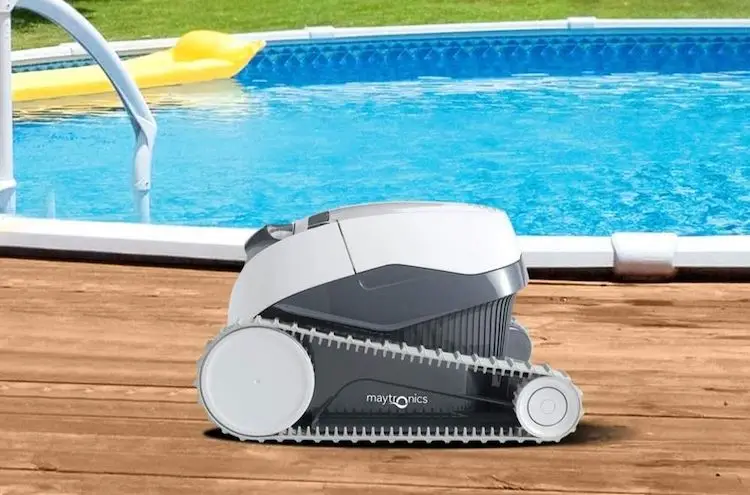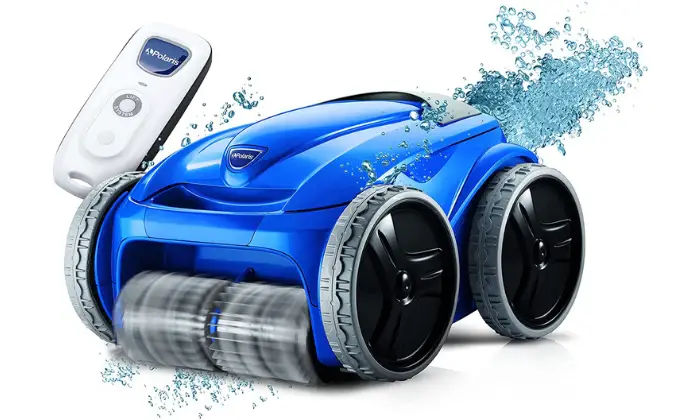Robotic pool cleaners are automated devices that clean pools without human intervention, while vacuums require manual operation and maintenance. Both have their advantages and disadvantages, making it essential to choose the right option depending on specific needs and preferences.
A clean, well-maintained pool can be a source of relaxation and enjoyment for homeowners or property managers. With regular use, pools often become dirty and contaminated with debris, making them unsafe for swimming. Robotic pool cleaners and vacuums are two options for keeping pools free of dirt and debris.
While both serve the same purpose, their work and efficiency differ. The choice between a robotic pool cleaner and a vacuum depends on factors such as the size and shape of the pool, cleaning requirements, and budget. This article will compare the two options and help you make an informed decision.

- What Is A Robotic Pool Cleaner?
- What Is A Pool Vacuum?
- Efficiency And Cleaning Capabilities Of Robotic Pool Cleaners
- Efficiency And Cleaning Capabilities Of Pool Vacuums
- Initial Costs
- Long-Term Cost Savings
- Maintaining A Robotic Pool Cleaner
- Maintaining A Pool Vacuum
- FAQs For Robotic Pool Cleaner Vs Vacuum
- Conclusion
What Is A Robotic Pool Cleaner?
Robotic pool cleaners are high-tech pool-cleaning machines equipped with the latest technology. They are designed to make cleaning your pool easier, quicker and more efficient. Some of its features and functionality include a built-in pump, advanced filtration system, and self-contained filtration bag.
Using a robotic pool cleaner has several advantages such as saving time, reducing energy consumption, and increasing the lifespan of your pool. When considering purchasing a robotic pool cleaner, you should consider the type of pool you have, the size, shape and depth among other factors.
Choosing the right robotic pool cleaner will ensure that your pool is clean and ready to use whenever you want it.
What Is A Pool Vacuum?
A pool vacuum is an essential tool for keeping your pool clean. They can handle all surfaces, from concrete to tiles, with various features such as scrubbing, suctioning, and filtration. Moreover, they operate effectively in all kinds of pools, whether in-ground or above-ground.
Using a pool vacuum, you can remove all kinds of debris from your pool, including leaves, twigs, and even fine particles like sand, pollen, and algae. Before investing in a pool vacuum, consider the size of your pool, the type of debris you need to remove, and the budget you have.
With a reliable pool vacuum, you’ll have a pool that looks and feels like new, so you can enjoy swimming all season long.
Efficiency And Cleaning Capabilities Of Robotic Pool Cleaners
Robotic pool cleaners and vacuums are both designed to clean swimming pools, but the former is more efficient and effective. Robotic pool cleaners can thoroughly remove dirt, debris, and algae, leaving your pool sparkling clean. They consume less power than traditional vacuums, so you’ll save money on energy bills.
Maintenance is also easier with robotic pool cleaners, as they require less manual cleaning and upkeep. Unlike vacuums, robotic pool cleaners are user-friendly and easy to operate. Whether you own a residential or commercial pool, investing in a robotic pool cleaner means you’ll have a cleaner, clearer pool with minimal effort.
Efficiency And Cleaning Capabilities Of Pool Vacuums
Pool vacuum cleaners have been staples in many households, providing efficient ways of cleaning pools and removing unwanted dirt, debris and algae. Compared to robotic pool cleaners, pool vacuums are more cost-effective and consume less power, making them ideal for regular maintenance.
They are also user-friendly and low maintenance. The effectiveness of pool vacuums in removing dirt and debris depends on the type of cleaner you choose. Whether you opt for manual or automatic cleaners, they offer varying levels of cleaning capability.
There are also vacuum cleaners with additional features for scrubbing the walls or floors of your pool. Despite their differences, robotic pool cleaners and vacuum cleaners can greatly benefit pool owners in terms of delivering crystal clear water and a visually pristine pool.
Initial Costs
Robotic pool cleaners undoubtedly have a higher initial cost than pool vacuums. The market’s leading robotic pool cleaners have features ranging from self-diagnosis to a weekly timer to automatic shut-off. However, the range of features naturally affects the price. Some entry-level robotic pool cleaners can be found at a lower price, but do not offer the same advanced features.
In contrast, pool vacuums are traditionally more affordable and can often be purchased as an attachment to a pool’s existing filtration system. A pool vacuum’s cost generally depends on its quality and features. Some types can operate automatically but are not equipped with sensors or advanced programming.
Ultimately, deciding between a robotic pool cleaner and a pool vacuum comes down to weighing the initial cost against long-term maintenance expenses.
Long-Term Cost Savings
When comparing the long-term cost savings of a robotic pool cleaner versus a vacuum, it’s important to factor in electricity and maintenance costs for both devices. Over a set timeframe, the cost comparison can vary significantly depending on usage and other factors.
However, robotic pool cleaners often have higher upfront costs but ultimately save money over time due to their energy-efficient operation and low maintenance needs. In contrast, vacuums require more frequent maintenance and can lead to higher electricity bills. Ultimately, the choice between a robotic pool cleaner and vacuum will depend on individual circumstances and priorities, but considering long-term cost savings is essential.
Maintaining A Robotic Pool Cleaner
Maintaining a robotic pool cleaner involves essential maintenance that ensures longer life. Regularly cleaning the filter and removing debris from the brush will prevent clogs. It’s important to check the water level and ph balance to optimize the cleaner’s performance.
Regularly inspecting the power cord and motor can prevent damage and ensure safe operation. Extending the cleaner’s lifespan may also require occasional repairs and replacements of parts. By following these simple maintenance tips, your robotic pool cleaner will continue to clean effectively for years to come.
Maintaining A Pool Vacuum

Pool vacuums need essential maintenance to ensure a longer lifespan. Repairs and replacements are inevitable but can be minimized with proper care. Clean the filter before and after every use and check it for damage or clogging. Ensure that the vacuum’s brushes, wheels and parts are free of debris or damage.
Regularly add lubrication and oil to ensure the vacuum functions smoothly. Monitor the vacuum’s hose for blockages or tears that could impede its suction. Store the vacuum in a clean, dry place, free of any potential damage.
Simple maintenance routines guarantee a clean pool with fewer issues and more fun.
FAQs For Robotic Pool Cleaner Vs Vacuum
What Is A Robotic Pool Cleaner?
A robotic pool cleaner is an autonomous machine that uses the same principle as an upright vacuum cleaner. These machines use electricity to power the motor, which, in turn, creates suction to remove dirt and debris from the pool’s surface and walls.
What Is A Pool Vacuum?
A pool vacuum is a cleaning device designed for in-ground and above-ground pools. It connects to a pool skimmer or dedicated vacuum line to suction the debris from the pool’s walls and floor. There are electric vacuum or manual vacuum, each with its unique features.
What Are The Advantages Of A Robotic Pool Cleaner?
A robotic pool cleaner has several benefits over a pool vacuum. For instance, it is highly efficient, saves water and electricity, and cleans the pool faster than vacuum cleaners. Also, robotic pool cleaners are versatile-unlike pool vacuums, can climb steps and navigate around obstacles, and are more reliable and easy to use.
What Are The Advantages Of A Pool Vacuum?
Pool vacuums are great for people on a tight budget and prefer a simple cleaning process. They work well for picking up larger debris items and have low maintenance costs because they lack moving parts. They vary in size and forms, and still manage to get the job done.
Are Robotic Pool Cleaners Worth The Investment?
Robotic pool cleaners can be pricey upfront, but they are worth the investment in the long run. They offer considerable long-term cost savings in terms of electricity, water consumption, chemicals, and labor expenses. In addition, most robotic pool cleaners last longer than other types of pool vacuum cleaners, making them a smart investment.
Which Is Better: Robotic Pool Cleaner Or Pool Vacuum?
Whether to choose a robotic pool cleaner or a pool vacuum is a personal preference. However, if you prioritize effectiveness, efficiency, and reduced hassle, a robotic pool cleaner is a better choice. On the other hand, if you have a limited budget and prefer a simpler cleaning process, then a pool vacuum cleaner may be more appropriate.
Conclusion
After comparing the robotic pool cleaner and vacuum, it is clear that both have their pros and cons. The robotic pool cleaner offers hands-free convenience and energy efficiency but comes with a hefty price tag. On the other hand, the vacuum is a budget-friendly option that requires some manual work but can still effectively clean a pool.
Ultimately, the choice comes down to personal preference and budget. Whichever option you choose, it is important to regularly clean your pool to ensure it stays healthy and safe for swimming. Taking care of your pool extends its lifespan and helps save money in the long run.
By choosing the right cleaning method and adhering to proper maintenance practices, you can enjoy a sparkling clean pool all summer long. You can search pool vacuum on Amazon.





